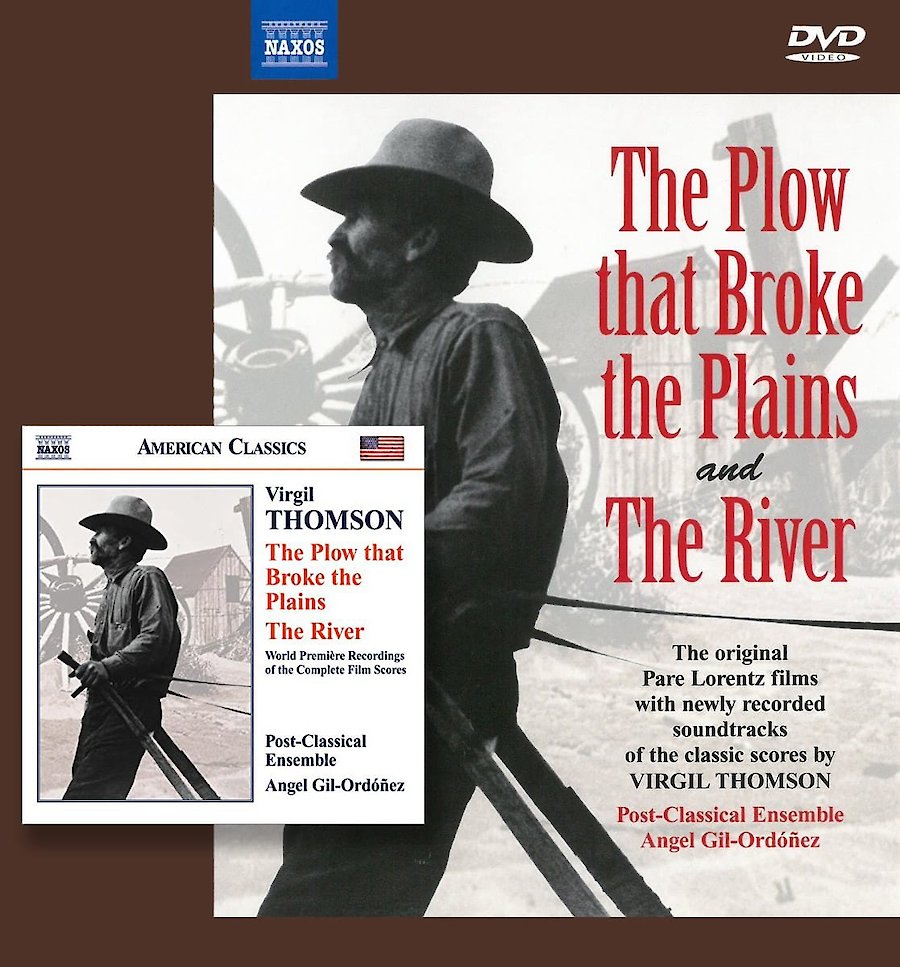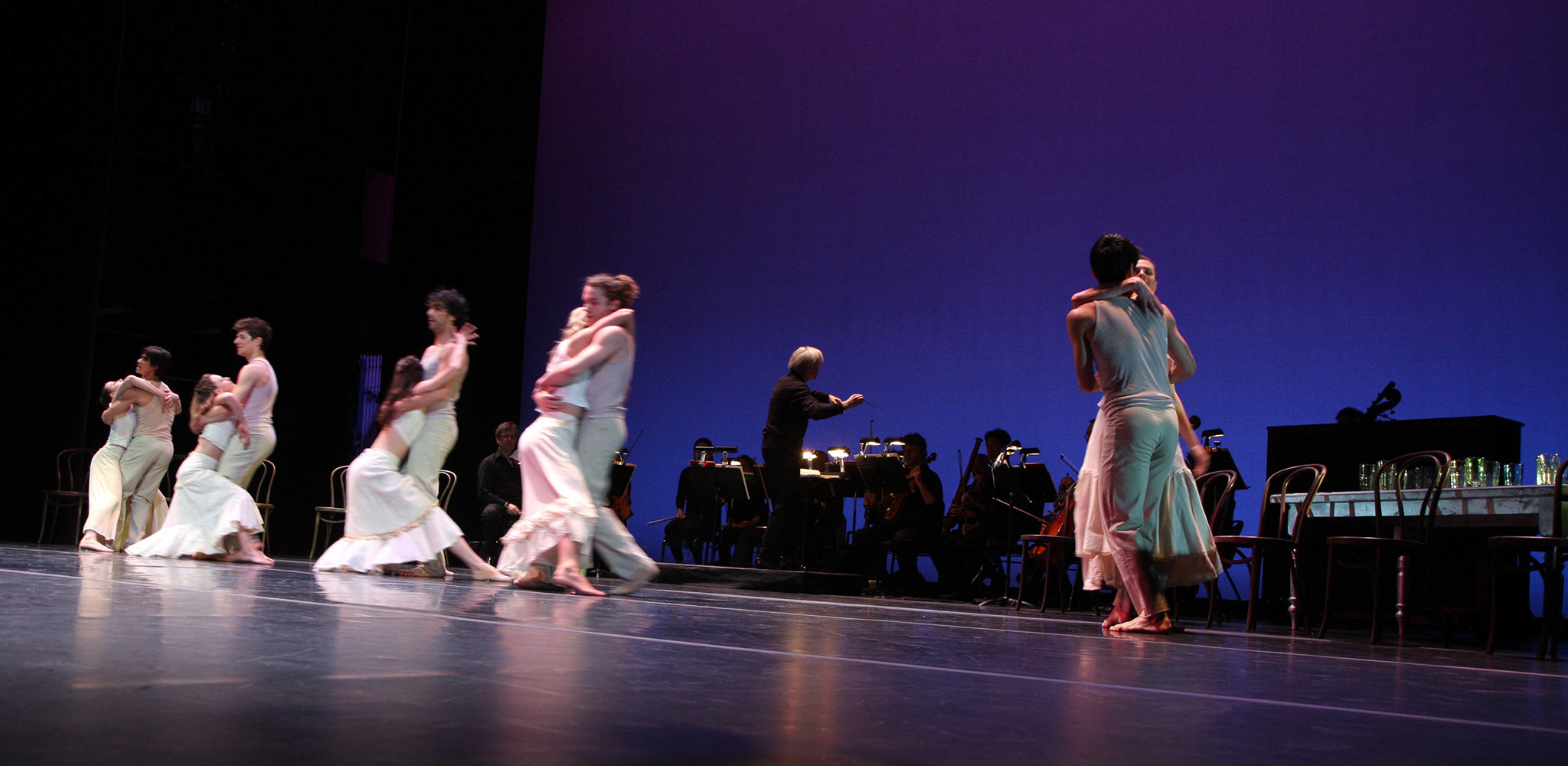Virgil Thomson: The Plow That Broke The Plains • The River (CD and DVD)
Summary

Here’s a treasure aimed at both the film buff and the music lover.
Michael AnthonyStarTribune
The performances are lively and stylish. Floyd King makes an aptly oratorical narrator. Extra features include interviews that shed light on the improbable geneses of these films.
Anthony TommasiniThe New York Times
(..) the DVD includes vibrant new recordings of the soundtracks by the D.C.-based PostClassical Ensemble.
Philip KennicottThe Washington Post
The original films by Pare Lorentz with newly-recorded soundtracks of the classic scores by Virgil Thomson. Lorentz’s The Plow that Broke the Plains (1936) and The River (1937) are landmark American documentary films. Aesthetically, they break new ground in seamlessly marrying pictorial imagery, symphonic music, and poetic free verse, all realized with supreme artistry. Ideologically, they indelibly encapsulate the strivings of Franklin Delano Roosevelt’s New Deal. Named “Best of the year recording” by Audiophile Audition.
Reviews
The Plow That Broke The Plains and The River / Thomson
If you have never heard the scores before and you have heard Copland you will be surprised at the similiarity of the music style. If you haven’t heard either composer this is at least one way to introduce yourself to Thomson with two of his better works and always remember the good value that Naxos has to offer. Highly recommended. Golden Scores Rating is ****.
Music to Heal a Land of Dust and Floods
But the sound quality on the original prints is thin and crackly. So for this DVD, produced by the critic and concert impresario Joseph Horowitz, Naxos recruited the conductor Angel Gil-Ordóñez to record the scores freshly with the PostClassical Ensemble. The performances are lively and stylish. Floyd King makes an aptly oratorical narrator. Extra features include interviews that shed light on the improbable geneses of these films.
On DVD, American Propaganda's High-Water Mark
The River was one of two major projects that Lorentz filmed with music commissioned from composer and famous music critic Virgil Thomson, and the DVD includes vibrant new recordings of the soundtracks by the D.C.-based PostClassical Ensemble.
Thomson: Plow that Broke the Plains, River (doc films)
The finer points of Thomson’s exquisite scores don’t come through on the original 1930s soundtracks, but that’s not the case with this DVD! The music and narration have been newly recorded giving these extraordinary documentaries a new lease on life. In the process, several music cuts made in the original films have been restored. We have the outstanding, up-and-coming conductor Angel Gil-Ordóñez and his PostClassical Ensemble to thank for this. Known in the Washington, D.C. area for their imaginative programming and sensitive performances, they really outdo themselves here. Their efforts would undoubtedly have pleased the composer, who was also a formidable music critic.
About this recording
Presentation
Art and propaganda meet to powerful effect in these two documentaries from the 1930s. Written and directed by Pare Lorentz, both The Plow That Broke the Plains and The River were made (in black & white) by the U.S government and clearly intended to promote President Franklin D. Roosevelt’s New Deal, a series of initiatives designed to help the country recover from the Great Depression. Yet that fact detracts not at all from their artistry, as the combination of Lorentz’s visuals and words and composer Virgil Thomson’s music (the voice-over narration and the scores for both films were “re-created” in 2005 for this release) is often quite genuinely transcendent.
Released in 1936 and sponsored by the U.S. Resettlement Administration, The Plow focuses on the Great Plains, those millions of grassy acres sprawled between Texas and Canada –”a high, treeless continent,” the narration tells us, “without rivers or streams, a country of high winds and sun, and of little rain”– and how, after settlers wiped out the Indians and buffalo who once inhabited the area, the great prosperity and progress that followed eventually left the land over-grazed and over-farmed, turning it into a parched, cracked Dust Bowl, its people impoverished and desperately in need of food, care, jobs, and another chance.
The River, from the following year, details the remarkable growth of trade and travel along the Mississippi River, where the booming farming, lumber, iron, coal, and steel industries stripped the surrounding land of its soil and roots, leading to the weakening of the river’s levees and disastrous flooding (shades of New Orleans 2005), with government agencies like the Tennessee Valley Authority and the Farm Security Administration offering the best chance to escape this ruinous cycle.
The films are filled with striking images and poetry, but in the end, it’s Thomson’s music that makes the greatest impression; truly cinematic in scope, it draws on well known tunes (There’ll Be a Hot Time in the Old Town Tonight), hymns (The Doxology) and the composer’s own brilliance to create a thoroughly American sound whose moods perfectly match and enhance what we see on the screen. An hour or so of bonus features includes discussion of all the films’ elements (Thomson himself weighs in during an old audio interview), as well as the original beginning and ending of The Plow.
—Sam Graham (Amazon)
Program / tracklist
- The Plow That Broke the Plains (1936) and The River (1937)
- Soundtracks re-created by Post-Classical Ensemble conducted by Angel Gil-Ordóñez.
Virgil Thomson’s scores for both films are among the most famous ever composed for the movies. Aaron Copland praised the music of The Plow for its “frankness and openness of feeling,” calling it “fresher, more simple, and more personal” than the Hollywood norm. He called the music for The River “a lesson in how to treat Americana.”
- Formats: Black & White, Dolby, NTSC
- Language: English (Dolby Digital 2.0 Stereo), English (Dolby Digital 5.1), English (DTS 5.1)
- Region: All
- Aspect Ratio: 1.33:1
- Running time: 112 minutes
Special features:
- George Stoney on The Plow and The River
- Stoney on The New Deal, The River, and race
- Charles Fussell on Virgil Thomson
- Virgil Thomson on Virgil Thomson (audio only)
- Original beginning and ending of The Plow
- Option to view The Plow and The River with original soundtrack and narration
Artists
- Post-Classical Ensemble
- Angel Gil-Ordóñez, music director
- Joseph Horowitz, artistic director
- Floyd King, narrator
- Pare Lorentz, film director
Discography menu
- Revueltas: Redes / Copland: The City. 2 Classic Political Film Scores
Released in March 2022 - Bernard Herrmann (1911–1975): Whitman – Souvenirs de voyage – Psycho: A Narrative for String Orchestra
Released in October 2020 - Falla: El amor brujo (1915 original version) / El retablo de Maese Pedro
Released in May 2019 - Lou Harrison: Violin Concerto / Grand Duo / Double Music
Released in April 2017 - Silvestre Revueltas: Redes (DVD)
Released in May 2016 - Dvořák and America
Released in June 2014 - Xavier Montsalvatge: Madrigal sobre un tema popular / 5 Invocaciones al Crucificado / Folia daliniana
Released in January 2014 - Aaron Copland: The City (DVD)
Released in January 2009 - Virgil Thomson: The Plow That Broke The Plains • The River (CD and DVD)
Released in January 2007 - Los Sueños de Manuel de Falla
Released in September 2000 - El Abuelo
Released in December 1998 - Música Contemporánea
Released in April 1996 - Film Music by Manuel Balboa
Released in January 1995

